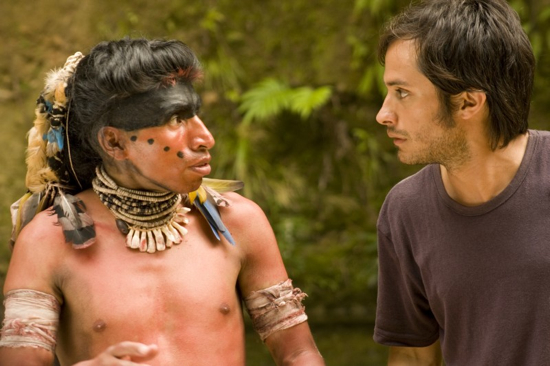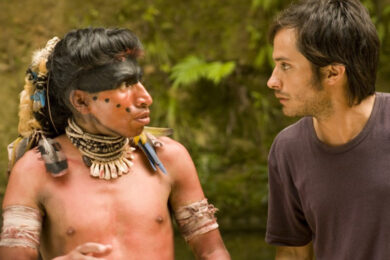Appearing to us once again as the natural successor to his frequent collaborator Ken Loach, with added meta flavours recalling docudrama master Peter Watkins, Scottish screenwriter Paul Laverty returns with Even The Rain (También la lluvia): a story both admirable in ambition and devastating in effect, neatly helmed by Spanish director Icíar Bollaín.
Originally conceived as an expository period drama set in the aftermath of Christopher Columbus’s arrival in the New World, targeting specifically the subsequent gold-hungry destruction of indigenous populations, Laverty re-wrote the script to integrate a recent uprising, the Cochabamba Water Wars of 2000, to further mesh ideas relating to exploitation, globalisation and elemental humanity. This decision, it seems, is key in communicating his intention to mobilise people and, if not arouse rebellion, at least stir their feelings. The film is a call to arms, a catalyst towards awareness and resistance. And on many levels, it is a profound success.
Starting with a dedication to historian Howard Zinn (whose book A People’s History Of The United States and view of Columbus have been influential on Laverty), Bollaín frames a memorable opening shot: a 30-foot crucifix strung from a helicopter, flown over the rainforest canopy onto the set of a substantial Spanish movie production. To begin with, the story focuses on a driven and conscientious director, Sebastían (Gael García Bernal), as he tries to make an historical piece laying bare the brutal European colonialism that enslaved the Americas in the 16th century. Among his crew is the producer, Costa (Luis Tosar), an arrogant and ruthless moneyman who goes to great lengths managing the budget and keeping the film on schedule, casually forsaking the natives, their sweat and their dignity in the process.
Looking to cut costs, they decide to shoot in Bolivia, South America’s poorest nation, seeing it as a means to procure cheap labour and extras and, in many ways, exploit the people just like the invaders their film condemns. Subsequently, the production team sets up an open casting call, but faced with an overwhelming number of locals lined up for hours to audition, decide to send the majority home unseen. One citizen, Daniel (Juan Carlos Aduviri), wanting his daughter to get an opportunity, kicks up a fuss, holding the audition flier in his hand: ‘Everyone will get a chance’.
In Daniel, Sebastían recognises the people’s discontent, and both father and daughter are eventually cast. Daniel stars as lead rebel Hatuey, a revolutionary icon who instigated an uprising against the conquistadors invading Hispaniola. Concurrently, the novice actor takes a major role in the first rebellion of the 21st century, against the World Bank and Bechtel Corporation’s policy to privatize the water supply in the town of Cochabamba. Water rates rise beyond people’s means and, after months of unrest, roads are blockaded throughout the country and martial law is declared. Amid trouble with the army, shots fired on innocent bystanders and Daniel getting locked up, the crew struggle not only to complete their film, but to survive.
Beneath the lattice of contemporary struggles and historical ones, Laverty not only pays tribute to the work of a great historian, but also brings to life the spirit of activism and possibility of resistance that bleeds across the pages of Zinn’s work. A narrative grounded in factual events cleverly shows us the constant struggle of man against oppressor, at the same time weaving in what appears to be its author’s own dilemma of making art versus the reality of human suffering. This is depicted through the money-minded Costa character, who faces a stark decision as the violence escalates. ‘Yaku’ (water) becomes a symbol of conscience and basic humanity and, though the ending may seem saccharine to the sneering, it gleams with authenticity, perhaps a revelation from Laverty’s own awakening during the three years he spent working in the region.
Credit must also go to Bollaín’s commendable direction of non-professionals, many of whom make up the leading cast in what could have been a potentially complicated plot. In a script that’s often literal in its explanations, and direct to the point of polemic, there is the sneaking impression that perhaps Laverty would rather do away with fiction and just pound us with facts. But it never becomes artless under Bollaín’s control. Points of debate and political rhetoric are framed within character and only occasionally are the visual juxtapositions overly straightforward (one example being the crew’s champagne buffet, intercut with scenes of indigenous poverty and thirst). But this seems in keeping with an overall style of no-nonsense filmmaking that wishes in part to interrogate the viewer, while also uncovering the hypocrisy inherent in such a production. There is this desire to stay loyal to the message, the emotional and humane truths, rather than obfuscate with distracting aesthetics. Which could explain why she and Laverty do not further investigate their own role in proceedings, and avoid any more potential narrative booby traps.
In a recent TV interview on Sky Arts’ In Conversation, Ken Loach attested to the fact that film criticism has moved away from talking about ideas and what the filmmakers are trying to say. Even The Rain demands this kind of analysis. But in an industry so saturated with bleeding hearts and insincere activism, there is a worry that it will be lost among them. Even a well-intentioned picture, when hitting high points of international acclaim, may be viewed by the skewed eye of a producer looking to exploit sincerity. And this is the crux of a ‘political’ film, particularly one with the profiteering of globalisation and the exploitation of labour at its centre. At the same time as being a message, a communication to an audience, film is a product, a commodity to be sold. Yet with each new Laverty script there is renewed hope that cinema can achieve its lofty ideals.
Even The Rain opens nationwide this Friday; a full list of screenings can be found here.



